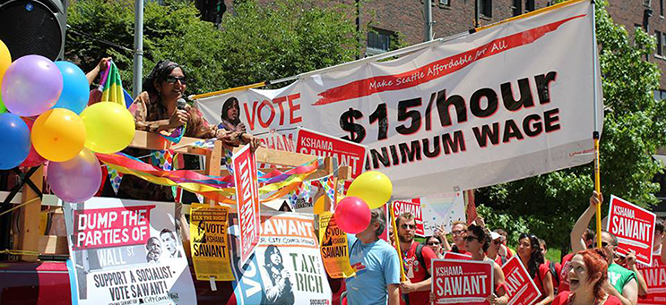Welcome to DU!
The truly grassroots left-of-center political community where regular people, not algorithms, drive the discussions and set the standards.
Join the community:
Create a free account
Support DU (and get rid of ads!):
Become a Star Member
Latest Breaking News
General Discussion
The DU Lounge
All Forums
Issue Forums
Culture Forums
Alliance Forums
Region Forums
Support Forums
Help & Search
General Discussion
Related: Editorials & Other Articles, Issue Forums, Alliance Forums, Region ForumsRadicals in City Hall: An American Tradition
from Dissent magazine:

[font size="1"]Kshama Sawant speaks at the Seattle Pride Parade, June 2013 (Vote Sawant/Facebook)[/font]
Radicals in City Hall: An American Tradition
By Peter Dreier - December 19, 2013
Socialist Kshama Sawant’s election to the Seattle City Council in November 2013 made national news, a kind of “man bites dog” story that the media found shocking and irresistible. The Los Angeles Times’s front-page article described Sawant as “41-year-old software-engineer-turned-far-left-sweetheart.” The Seattle Times called her “the council’s first socialist member in modern history.”
In fact, the United States has a long tradition of municipal socialism. One hundred years ago, at the Socialist Party’s high point, about 1,200 party members held public office in 340 cities, including seventy‑nine mayors in cities such as Milwaukee, Buffalo, Minneapolis, Reading, and Schenectady. (Before Sawant, the last socialist to get elected in Seattle was journalist Anna Louise Strong, who won a seat on the School Board in 1916). These local leaders, whose ranks included working-class labor union members and middle-class radicals such as teachers, clergy, and lawyers, worked alongside progressive reformers to improve living and working conditions in the nation’s burgeoning cities. In today’s hyper-capitalist economy, their experience may still offer some lessons for contemporary activists.
Seattle political analysts are still trying to assess how Sawant—who beat sixteen-year incumbent Richard Conlin by a slim margin despite being outspent more than two to one—managed to pull off her remarkable upset. Her effective grassroots campaign and knack for proposing policy ideas that seemed both radical and reasonable played a key role. But Sawant’s victory is also a result of the growing unease—in Seattle and across the country—with widening inequality and the growing influence of big business in politics. Much of this was expressed by the Occupy Wall Street movement that began in September 2011, but while Occupy activists have generally eschewed electoral politics as a strategy for change, their message has continued to resonate with the American public, and many mainstream politicians and pundits have embraced the “1 percent vs. 99 percent” theme.
On the same day that Sawant won her city council seat, progressives and radicals around the country won a number of significant local victories. The most celebrated was Bill de Blasio’s landslide election to the New York City mayoralty on a platform challenging the city’s growing inequality and gentrification. Minneapolis voters elected City Council member Betsy Hodges—a longtime activist with the progressive grassroots group Take Action Minnesota who called on people to “free ourselves from the fear that keeps us locked into patterns of inequality”—as their new mayor. Another longtime Take Action Minnesota member, Dai Thao, became the first Hmong city council member in the St. Paul’s history. In Minneapolis, Ty Moore, an Occupy organizer and Socialist Alternative candidate, narrowly lost a contest for City Council. Meanwhile, Boston voters catapulted union leader and state legislator Martin Walsh into the mayor’s office, despite business-led efforts to lambast him as a radical. ......................(more)
The complete piece is at: http://www.dissentmagazine.org/online_articles/radicals-in-city-hall-an-american-tradition
InfoView thread info, including edit history
TrashPut this thread in your Trash Can (My DU » Trash Can)
BookmarkAdd this thread to your Bookmarks (My DU » Bookmarks)
0 replies, 329 views
ShareGet links to this post and/or share on social media
AlertAlert this post for a rule violation
PowersThere are no powers you can use on this post
EditCannot edit other people's posts
ReplyReply to this post
EditCannot edit other people's posts
Rec (2)
ReplyReply to this post